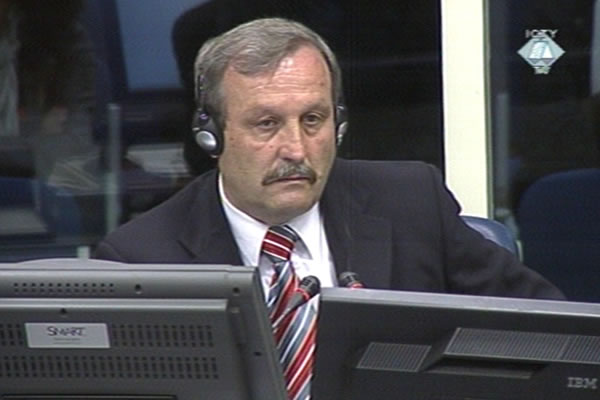Home
MARTIC’S DIAGNOSIS OF MILAN BABIC’S MENTAL HEALTH DISMISSED
Having considered Milan Babic’s psychological and psychiatric file, the Trial Chamber established that there was no evidence to show that Milan Babic suffered from any personality disorders that could discredit him as a witness. The joint effort of Radovan Karadzic and Milan Martic to discredit Babic and his testimony at previous trials thus ended in failure
 Milan Martic, defence witness of Radovan Karadzic
Milan Martic, defence witness of Radovan Karadzic Last week, the statement that Milan Martic gave to Radovan Karadzic’s defense was admitted into evidence. In the statement Martic contested the existence of a joint criminal enterprise aimed at eliminating non-Serbs from large parts of Croatia and Bosnia and Herzegovina that were claimed by the Serbs as their own. Martic also contested the allegations from late Milan Babic’s previous testimony and statements. Parts of Babic’s statements were admitted into evidence as prosecution exhibits in the case against Karadzic. Martic alleged that Babic was a ‘mentally ill’ man who suffered from ‘paranoia and narcissism’.
Martic’s ‘diagnosis’ was dismissed once and for all today, as was Karadzic’s motion for the disclosure of psychological and psychiatric assessments of Milan Babic’s mental health. Babic was evaluated in the Tribunal’s Detention Unit before his suicide in March 2006. Having seen the entire psychological and psychiatrist file, the Trial Chamber concluded that there was no evidence that Milan Babic suffered from any personality disorder that might bring into question his credibility as a witness.
In the cross-examination, prosecutor Alan Tieger contested other claims from Martic’s statement in which he denied the existence of the joint criminal enterprise. Prosecutor Tieger insisted on the nexus between the persons and forces that worked in concert to bring about the general goal. The prosecutor first showed three documents in which Serb leaders in Bosnia and Herzegovina, Croatia and Serbia spoke in virtually identical terms about the ‘joint goal to create a united Serb state’. The prosecutor then highlighted the measures taken in Pale, in Knin and Belgrade to accomplish the goal: creating the Posavina corridor, establishing special units such as the Red Berets to engage in secret warfare or establishing 26 training camps in BH and Croatia.
The prosecutor also highlighted the links and hierarchy that brought together various persons to work together to accomplish a common goal in different parts of Croatia, BH and Serbia. These persons included Captain Dragan, Arkan, Franko Simatovic and Jovica Stanisic, Rade Kostic and Ilija Kojic. Martic blamed Milan Babic for bringing Captain Dragan to Knin. As Martic explained, Arkan was a man ‘close to the federal SUP’. Martic admitted that the Serbian State Security Service agents Kostic and Kojic were sent from Belgrade to Knin at his request to serve as his assistants in the RSK Interior Ministry.
As Martic explained, he cooperated with Slobodan Milosevic but didn’t receive any orders from him, remaining adamant even after the prosecutor showed him a document from December 1994, in which Milosevic issued an order specifically to Martic as the RSK president and to General Celeketic, the Chief of Main Staff of the Serbian Krajina Army. The prosecutor also showed a cable sent the next day from Knin to inform Belgrade that the ‘president’s order has been fulfilled’. Martic explained that it was ‘a clumsy wording’. ‘This was a matter of courtesy’ rather than a report informing the superior that his order had been carried out, Martic said.
After Milan Martic completed his evidence, Karadzic called Zorica Subotic, a forensic expert on ballistics from the Ministry of Justice of the Republic of Serbia.Linked Reports
- Case : Karadzic
- 2013-05-09 ‘PSYCHIATRIST’ MARTIC’S SHOWDOWN WITH DECEASED BABIC
- 2013-05-08 GALIC: OTHERS ORCHESTRATED SARAJEVO DRAMA
- 2013-05-07 FOOLS WHO TARGETED SARAJEVO CIVILIANS
- 2013-05-14 DEFENSE’S BALLISTIC EXPERT: ‘DISTORTED MIRROR-IMAGE’
- 2013-05-15 KARADZIC’S EXPERT SPECULATES ABOUT MARKALE EXPLOSIONS
- 2013-05-16 DEFENSE WITNESS OFFENDED ‘PERSONALLY AND PROFESSIONALLY’
